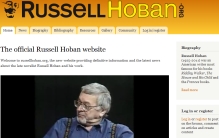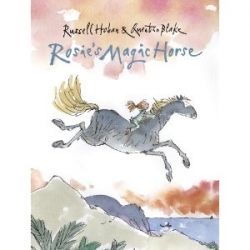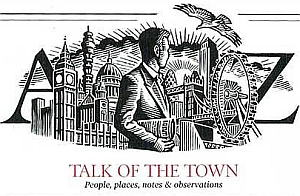SA4QE day 2012 being a Saturday, my two boys were off school, so I thought this a good time to introduce them to the wonders of 4qation. Joe (6) had in fact had an early introduction to the activity but I doubt he remembered much about it. I sat him and his brother Charlie, 5, down in the front room with some sheets of yellow paper and read them various poems from The Last of the Wallendas to encourage them to choose a poem or a line they liked and write it down. They found the poems a bit difficult to get into however, so I switched to a Hoban they were more familiar with, Trouble on Thunder Mountain. The book is a favourite one at bedtime, the fantastic Quentin Blake illustrations as much a joy as the beautifully-told short story of a small family of dinosaurs uprooted from their mountain home by a nut who wants to replace it with a plastic one. While I read the book Charlie picked out single words and wrote them down, and Joe did a drawing of his favourite part of the story (we won't hold it against him) when the dinosaurs' mountain is blown up by Mr Flatbrain and his team of robots. After I'd finished reading we talked about the story and agreed that having your home blown up and being forcibly relocated was A Bad Thing, and Joe wrote down this:
"A hi-tech plastic mountain?" said Dad.
"It takes a man named Flatbrain to think of something like that," said Jim.
- from Trouble on Thunder Mountain
I had discovered earlier that morning that today was also, by a lovely coincidence, National Libraries Day, in which people were being encouraged to visit their local library and get a Message across to the Authorities that our society would be the poorer for the closure of these services. Whether I personally feel that some in the UK's coalition government are akin to Mr Flatbrain, I couldn't possibly comment.
So with libraries and books very much in mind, we headed off on a very cold and grey afternoon just on the edge of snow into the town centre. Rugby is fortunate in some ways in that its main library building is also a museum and tourist centre, so is probably unlikely to be among those shut by the Flatbrains.
We went in half an hour before closing time and toured the shelves, picking out books that the boys found interesting, on minerals, stars, Sikhism, the Sahara Desert. I explained the Dewey system and we looked up "cars" in the catalogue and went looking for the relevant shelf number. We looked in the Fiction section for books by Russell Hoban and found a hardback of Angelica Lost and Found. I told them about the painting on the cover and Ruggiero flying on the hippogriff to save Angelica.
As much as I love the internet, and the boys are very web-literate for their ages, this is simply not something you can do online.
Suddenly it was nearly closing time, so we hurried into the children's section and found a leaflet holder on the wall in which - after explaining it was not an act of vandalism - I encouraged Joe to secrete his quote:
Then on the way out I left my own quotes, chosen earlier from The Moment under The Moment, in a good place by the front door (I did actually pop it into the box, which seemed otherwise empty, after taking the photo):
The people who run the world now were children once. What went wrong? Why do perfectly good children become rotten grown-ups?
- from Pan Lives (The Moment under The Moment)
In my house of childhood of the mind lives Vol. XVII of the Harvard Classics, the only book in the Five-Foot Shelf much handled; Locke and Hume and Darwin looked as new as the day they were unpacked but Vol. XVII was Folklore and Fable, Andersen and Aesop and the brothers Grimm, and it was in heavy use. Oscar Wilde’s House of Pomegranates and The Arabian Nights live there also. As a child I did much of my reading in the room in our house called the library. It was lined with books in Russian, Yiddish, and English and had a massive oak table. No one else I knew had such a room. I had outdoor reading places as well, and of these my favourite was a big old wild cherry tree where in season I read Robin Hood and ate little sun-warmed black cherries.
- from “‘I, that was a child, my tongue’s use sleeping…’” (The Moment under The Moment)
We went home just as it started snowing heavily, and I tweeted and Facebooked it all.










 On 4 February 2012 the Slickman A4 Quotation Event celebrated
On 4 February 2012 the Slickman A4 Quotation Event celebrated 


 In 2005 the first international convention for Russell Hoban fans took place in London, and was marked by the publication of a fantastic 48-page booklet featuring exclusive contributions from innumerable fans and associates including novelist David Mitchell and actress Glenda Jackson. A wonderful memento of the event, it's also a beautiful collector's item and must-have for any Hoban fan. Although in limited supply, copies of the booklet are still available at £6.00 each plus p&p. Order direct from
In 2005 the first international convention for Russell Hoban fans took place in London, and was marked by the publication of a fantastic 48-page booklet featuring exclusive contributions from innumerable fans and associates including novelist David Mitchell and actress Glenda Jackson. A wonderful memento of the event, it's also a beautiful collector's item and must-have for any Hoban fan. Although in limited supply, copies of the booklet are still available at £6.00 each plus p&p. Order direct from  Russell Hoban turned 86 on 4 February 2011 and fans celebrated in traditional style by leaving quotes from his books in public places. Browse their quotes
Russell Hoban turned 86 on 4 February 2011 and fans celebrated in traditional style by leaving quotes from his books in public places. Browse their quotes  To celebrate 30 years in print of Russell Hoban's most famous novel
To celebrate 30 years in print of Russell Hoban's most famous novel 





